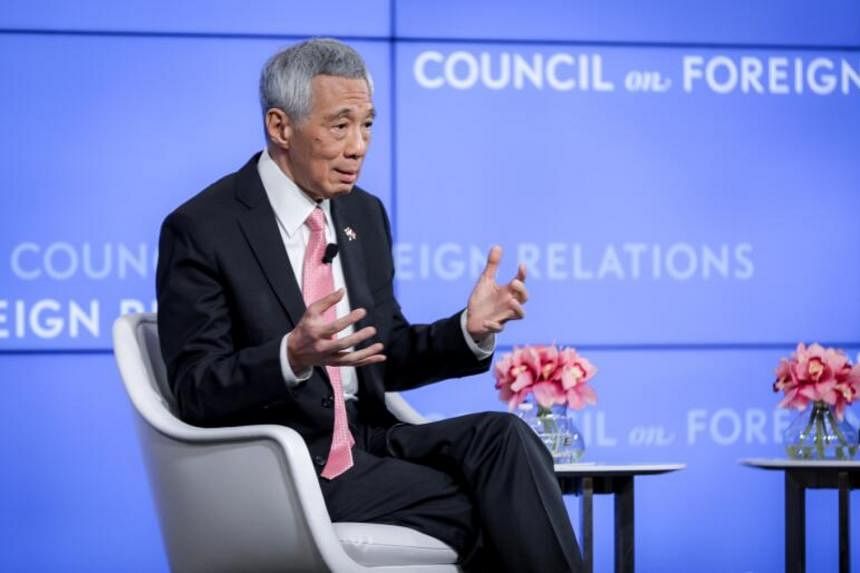WASHINGTON - The war in Ukraine has negatively impacted Asia and damaged the international framework for law and order and peace, said Prime Minister Lee Hsien Loong on Wednesday (March 30).
The crisis has also impaired the global multilateral system, a worrying development for a small nation like Singapore which depends on globalisation for its livelihood, he added.
At an hour-long dialogue organised by the Washington-based Council on Foreign Relations think-tank, PM Lee laid out how Russia's invasion of its neighbour affects Asia, including Singapore, a deep concern that he and United States President Joe Biden expressed after their meeting on Tuesday.
Much of the wide-ranging dialogue was centred on the Ukraine war and its ripple effects on the world, from climate cooperation to energy security.
PM Lee, who has spent the week meeting America's top leaders, also gave his take on South-east Asia's security and economic landscape amid US engagement in the region.
He condemned the Russian invasion as something that endangered the sovereignty of all countries, especially small ones.
"If a principle is accepted, that crazy decisions and historical errors are the justification for invading somebody else, I think many of us are going to be feeling very insecure," he said at the event, attended in person by dozens of industry leaders and officials, and streamed online to more.
Moreover, he said, the conflict has rent relations in Europe between developed countries and Russia, making it more difficult for countries to work together on issues from trade to nuclear non-proliferation.
"Now, it is win-lose, you want the other guy to be down, fix him, crash his economy. So, how then do most of the countries hang together and cooperate with one another and not fall into disorder, autarky or anarchy?" he said.
What happens in Ukraine will also further strain US-China relations, affecting the rest of the world, said PM Lee.
Governments in the region will also draw from the crisis their own lessons about who they can rely on for defence, he added.
He cited how the crisis has prompted some in Japan to publicly consider whether the country should host US nuclear weapons, even though the government has rejected the idea, and how South Korea opinion polls have of late reflected a public reception to the idea of nuclear capabilities.
"The thought is planted and it will not go away because the implication from Ukraine is that nuclear deterrence is something which can be very valuable," said PM Lee. "I think we're heading into very dangerous directions."
Opinion polls have shown a decline in confidence among the Taiwanese public that America will come to their aid should Taiwan be attacked, he said. "These calculations will be made. It will not change the scene overnight. But all these are significant strategic recalibrations," said PM Lee.
The crisis has also highlighted the importance of having institutions in the Asia-Pacific that can help avoid conflict and head off a failure of deterrence, he added.
These institutions will have to enable a difficult adjustment - "how to accommodate a China which is going to become more developed, larger... and yet not become overbearing on the rest of the world and acceptable to the US, which currently is the dominant military power worldwide".
PM Lee said: "You need to give thought to this and steer things in a direction which does not lead you to a hot conflict."
The dialogue followed a day of meetings in Washington for PM Lee, including with Vice-President Kamala Harris, on Tuesday.
They discussed new areas of cooperation, including cyber security, space cooperation and infrastructure development.


